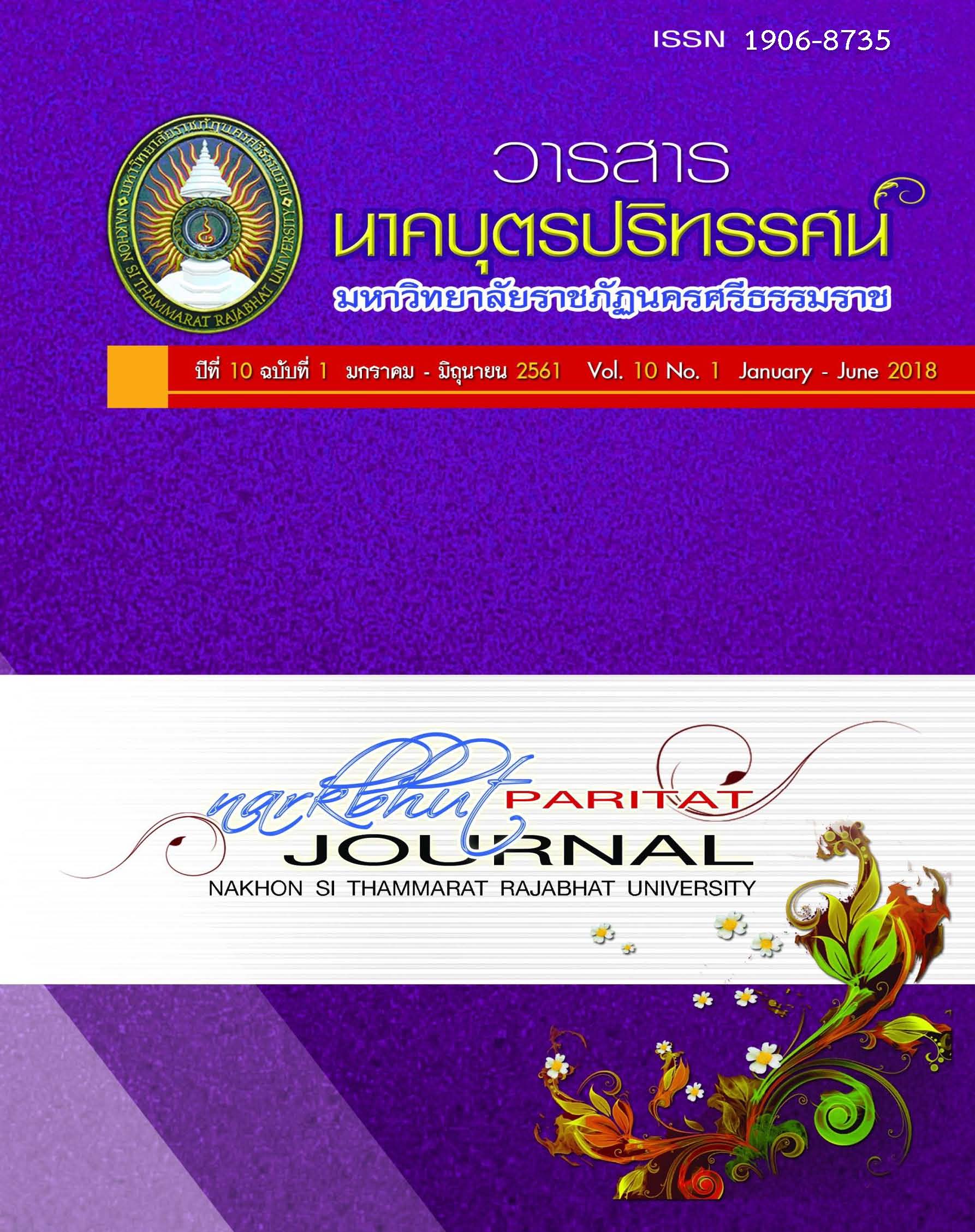รูปแบบการบริหารการเปลี่ยนแปลงของผู้บริหารสถานศึกษาขั้นพื้นฐานขนาดเล็ก สังกัดสำนักงานเขตพื้นที่การศึกษามัธยมศึกษา เขต 12 A Model of Change Management of Administrators in the Small-Size Basic Education Institutions under the Jurisdiction of The Secondary E
Main Article Content
บทคัดย่อ
บทคัดย่อ
การวิจัยครั้งนี้มีวัตถุประสงค์เพื่อศึกษาสภาพการบริหารการเปลี่ยนแปลงของผู้บริหารสถานศึกษาขั้นพื้นฐานขนาดเล็ก สังกัดสำนักงานเขตพื้นที่การศึกษามัธยมศึกษา เขต 12 และเพื่อสร้างรูปแบบและตรวจสอบรูปแบบการบริหารการเปลี่ยนแปลงของผู้บริหารในสถานศึกษาขั้นพื้นฐานขนาดเล็ก สังกัดสำนักงานเขตพื้นที่การศึกษามัธยมศึกษา เขต 12 โดยใช้ระเบียบวิธีวิทยาการวิจัยแบบผสานวิธี (Mixed Method) โดยมี 3 ขั้นตอน คือ 1) ศึกษาสภาพการบริหารการเปลี่ยนแปลง โดยการศึกษาเอกสารและงานวิจัยที่เกี่ยวข้องและสอบถามผู้บริหารสถานศึกษาขั้นพื้นฐานขนาดเล็ก สังกัดสำนักงานเขตพื้นที่การศึกษามัธยมศึกษา เขต 12 จำนวน 55 คน 2) การสร้างรูปแบบ โดยการศึกษาเอกสารทฤษฎีและงานวิจัยที่เกี่ยวข้องกับการบริหารการเปลี่ยนแปลงร่วมกันกับข้อมูลที่ได้จากการสังเคราะห์ข้อมูลในตอนที่ 1 และ 3) การตรวจสอบรูปแบบ โดยการสัมมนาอิงผู้เชี่ยวชาญ (connoisseurship) จำนวน 9 คนและการสนทนากลุ่ม (Focus Group Discussion) ผู้บริหารสถานศึกษาขั้นพื้นฐานขนาดเล็ก สังกัดสังกัดสำนักงานเขตพื้นที่การศึกษามัธยมศึกษา เขต 12 จำนวน 12 คน โดยใช้แบบสอบถามมาตราส่วนประมาณค่า 5 ระดับ และแบบแผนสัมมนาอิงผู้เชี่ยวชาญเป็นเครื่องมือในการรวบรวมข้อมูล วิเคราะห์ข้อมูลด้วยการหาค่าความถี่ ค่าร้อยละ ค่าเฉลี่ย ส่วนเบี่ยงเบนมาตรฐานและการวิเคราะห์เนื้อหา
ผลการวิจัยพบว่า
- สภาพการบริหารการเปลี่ยนแปลงตามความคิดเห็นของผู้บริหารสถานศึกษาขั้นพื้นฐานขนาดเล็ก สังกัดสำนักงานเขตพื้นที่การศึกษามัธยมศึกษา เขต 12 โดยภาพรวมอยู่ในระดับมาก มีค่าเฉลี่ย 4.27 เมื่อพิจารณารายองค์ประกอบจากมากไปหาน้อย พบว่า การดำเนินการเปลี่ยนแปลง มีค่าเฉลี่ย 4.42 รองลงมา คือ การสร้างความพร้อมในการเปลี่ยนแปลง มีค่าเฉลี่ย 4.28 และองค์ประกอบที่มีค่าเฉลี่ยต่ำที่สุด คือ การประเมินผลและการรักษาการเปลี่ยนแปลง มีค่าเฉลี่ย 4.10
- รูปแบบการบริหารการเปลี่ยนแปลงของผู้บริหารสถานศึกษาขั้นพื้นฐานขนาดเล็ก สังกัดสำนักงานเขตพื้นที่การศึกษามัธยมศึกษา เขต 12 ประกอบด้วย 3 องค์ประกอบ คือ 1) การสร้างความพร้อมในการเปลี่ยนแปลง ประกอบด้วย การสร้างความตระหนัก การวิเคราะห์สถานการณ์ การสร้างวิสัยทัศน์ การสร้างทีมผู้นำ การวางแผนการดำเนินงานและการเลือกกลยุทธ์การเปลี่ยนแปลง 2) การดำเนินการเปลี่ยนแปลง ประกอบด้วย การสร้างการสื่อสาร การสร้างโครงสร้างการดำเนินงาน การส่งเสริมและพัฒนาการเปลี่ยนแปลง การสร้างความสำเร็จระยะสั้นและการสร้างการเปลี่ยนแปลงอย่างต่อเนื่อง และ 3) การประเมินผล และการรักษาการเปลี่ยนแปลง ประกอบด้วยการประเมินผลการเปลี่ยนแปลงและการรักษาการเปลี่ยนแปลง
- การตรวจสอบรูปแบบการบริหารการเปลี่ยนแปลงของผู้บริหารสถานศึกษาขั้นพื้นฐานขนาดเล็ก สังกัดสำนักงานเขตพื้นที่การศึกษามัธยมศึกษา เขต 12 ซึ่งประกอบด้วย 1) การตรวจสอบรูปแบบ โดยใช้การสัมมนาอิงผู้เชี่ยวชาญ (connoisseurship) พบว่า รูปแบบมีความถูกต้อง ครอบคลุม (Accuracy) และความเหมาะสม (Appropriateness) 2) การตรวจสอบรูปแบบ โดยใช้การสนทนากลุ่ม (Focus Group Discussion) พบว่า มีความเป็นไปได้ (Feasibility) และเป็นประโยชน์ (Utility) ผลการตรวจสอบอยู่ในเกณฑ์ร้อยละ 80-100
คำสำคัญ : การบริหารการเปลี่ยนแปลง, ผู้บริหารสถานศึกษาขั้นพื้นฐานขนาดเล็ก
Abstract
The purposes of this research were: (1) to study the change management circumstances of the administrators in the small-size basic education institutions under the jurisdiction of The Secondary Educational Service Area Office 12, and (2)to construct and to check a model of change management of the administrators in the small-size basic education institutions under the jurisdiction of The Secondary Educational Service Area Office 12. The research methodology was a Mixed Method. The research procedure followed three phases: 1) Studying the change management circumstances based on an investigation of documents, concepts, theories and a review of relevant researches and query of 55 administrators in the small-size basic education institutions under the jurisdiction of The Secondary Educational Service Area Office 12; 2) Constructing a model based on an investigation of documents, concepts, theories and a review of relevant researches in conjunction with the data in phases 1; and 3) Checking a modelby connoisseurship among 9 education experts, and focus group discussion among 12 administrators from the small-size basic education institutions under the jurisdiction of The Secondary Educational Service Area Office 12. The research instrument consisted of 5 Likert rating scale questionnaire, and connoisseurship were used in data collection. The data were analyzed by frequency, percentage, mean, standard deviation, and content analysis.
The findings of the study were as follows:
- As a whole, the change management circumstances in the opinion of the administrators in the small-size basic education institutions under the jurisdiction of The Secondary Educational Service Area Office 12, were at a high level with the average score of 4.27. When each factor was considered, from the highest to the least, it was found that the average score of the implementing change was 4.42, of the creating readiness was 4.28, and of the evaluating and institutionalizing change was 4.10, respectively.
- A model of change management of the administrators in the small-size basic education institutions under the jurisdiction of The Secondary Educational Service Area office 12 consisted of 3 factors: 1) Creating readiness for change: creating awareness, situational analysis, creating a vision, creating a leader team, planning change and choosing a strategy of change; 2) Implementing change: creating communication, creating structure, promoting and developingchange, providing short term wins and creating a constant change;3) Evaluating and institutionalizing change: evaluating change and institutionalizing change.
- In checking a model of change management of the administrators in the small-size basic education institutions under the jurisdiction of The Secondary Educational Service Area Office 12 by 2 steps: 1)by connoisseurship among 9 education experts, it was found that the model was accurate and appropriate, and 2) by focus group discussion among 12 administrators from the small-size basic education institutions under the jurisdiction of The Secondary Educational Service Area Office 12, it was revealed that the model was feasible and utilizable. The checking result was at 80-100 per cent.
Keyword: Change Management, The administrators in the small-size basic education
institutions
Article Details
เอกสารอ้างอิง
Don Hellriegel, John W. Slocum, Jr. (1996). Management Cincinnat. Ohio: South-Western
College Pub.
Donnelly. (1975). Instructor’s manual fundamentals of management. New York: n.p.
Griffiths, Danaial E. (1964). Administrative Theory and Change in organization. In Mile,
Mathew B. (ED). Innovation in Education. New York: Teachers College.
Jaidee, N. (2015). Transformational Change Modeling to Empower Teachers of Private
Schools. Under the Office of the Private Education Commission in the Region. Ph.D. thesis (Educational Administration) Ramkhamhaeng University. (in Thai).
Kota, S. (2010). Small form of school change management. Ph.D. thesis Faculty of
Management Studies University of Eastern Asia. (in Thai).
Kotter, J.P. (1996). Leading Change. Boston, MA: Harvard Business School Press.
Malakul na Ayuttaya, P. (2008). Organization Development. Bangkok: Mister copy. (in Thai).
Mike Beer. (2003). Managing Change and Transition. Bangkok : Epexrnth. (in Thai).
Muenkota, R. (2014). Model of Strategic Planning in Changing Management of Secondary
School Administrators in International School Project. Ph.D. thesis (Educational Administration) Graduate School University of Eastern Asia. (in Thai).
National Education Commission. (2002). The National Education Act, BE 2542 (1999) and the
Amendments (No. 2) BE 2545. Bangkok: Phrik hwank raffikh. (in Thai).
Rutjarean, T. (2007). Professionalism in organizing and administering education.
Bangkok: Lt Press Co., Ltd. (in Thai).
Short, Larry E. (1978). Planned Organizational Change. In Knudson, Harry R. & Fleener, Patrick
C, (Eds.). Organizational Behavior: A Management Approach. Cambridge: Winthrop.
Simmalee, S. (2015). Quality management change. Journal of Education Srinakharinwirote
University. Year 12 No. 23. 108-116. (in Thai).
Somprad, K. (2016). Leadership and Leadership Learning for School Administrators. Khon
Kaen: khlạng nana withya Printing. (in Thai).
Steers, R. M. (1977). Organization effectiveness: A behavioral view. Valifornia : Goodyear


